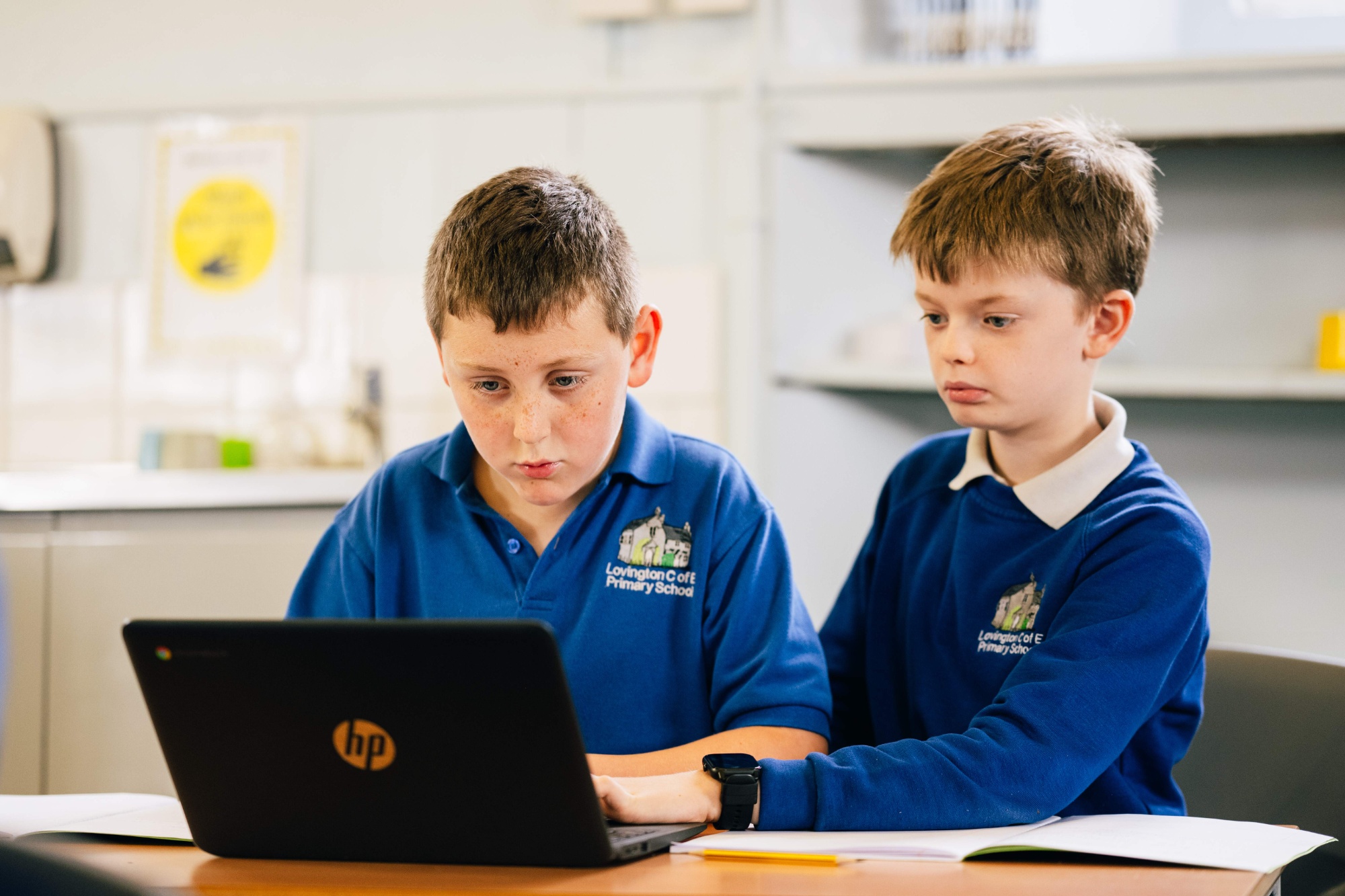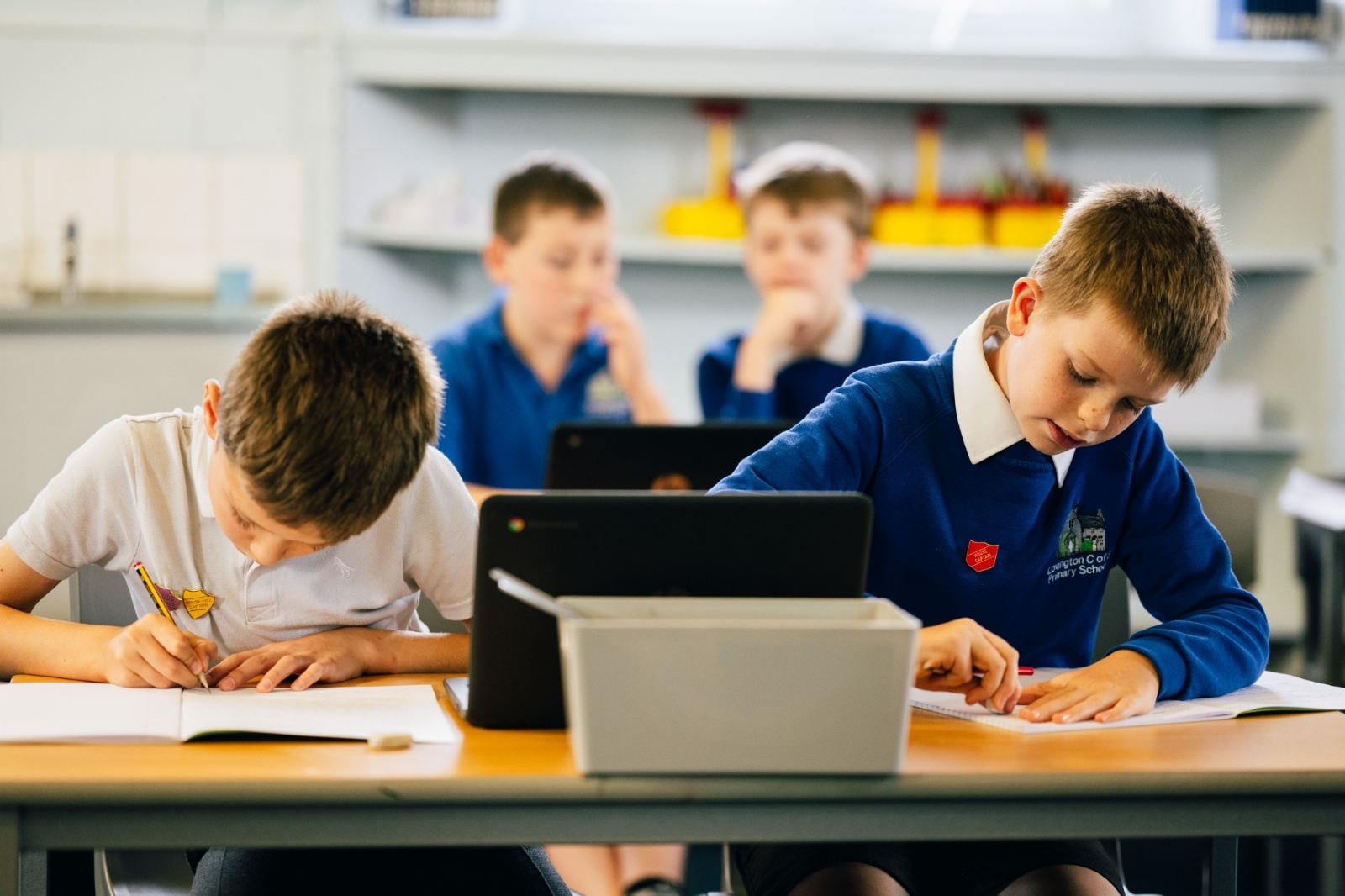Computing
Intent
At Lovington Primary School we want to develop ‘thinkers of the future’ through a modern, ambitious and relevant education in computing.
We want to equip pupils to use computational thinking and creativity that will enable them to become active participants in the digital world. It is important to us that the children understand how to use the ever-changing technology to express themselves, as tools for learning and as a means to drive their generation forward into the future.
Whilst ensuring they understand the advantages and disadvantages associated with online experiences, we aim for Lovington children to develop as respectful, responsible and confident users of technology, aware of measures that can be taken to keep themselves and others safe online.
Our aim is to provide a computing curriculum that is designed to balance acquiring a broad and deep knowledge, alongside opportunities to apply skills in various digital contexts.
Beyond teaching computing discreetly, we will give pupils the opportunity to apply and develop what they have learnt across wider learning in the curriculum.

“We’re currently preparing students for jobs that don’t yet exist, using technologies that haven’t been invented, in order to solve problems we don’t even know are problems yet.”
-Richard Riley
Implementation
Our scheme of work for Computing is adapted from the ‘Teach Computing’ Curriculum and covers all aspects of the National Curriculum. This scheme was chosen as it has been created by subject experts and based on the latest pedagogical research. It provides an innovative progression framework where computing content (concepts, knowledge, skills and objectives) has been organised into interconnected networks called learning graphs.
The curriculum aims to equip young people with the knowledge, skills and understanding they need to thrive in the digital world of today and the future.
The curriculum can be broken down into three strands: computer science, information technology and digital literacy, with the aims of the curriculum reflecting this distinction.
The national curriculum for computing aims to ensure all pupils:
“Can understand and apply the fundamental principles and concepts of computer science, including abstraction, logic, algorithms and data representation, (Computer science) can analyse problems in computational terms, and have repeated practical experience of writing computer programs in order to solve such problems, (Computer science) can evaluate and apply information technology, including new or unfamiliar technologies, can analytically solve problems (Information technology) and are responsible, competent, confident and creative users of information and communication technology (Digital literacy).”
A key part of implementing our computing curriculum is ensuring the safety of children, and we aim to give children the necessary knowledge and skills to keep themselves safe online. At the start of the year, each class discusses and agrees on a set of online safety rules when using the internet in the classroom, which are regularly referred to.
Our curriculum also offers discrete units which are taught at some point throughout the year. Lessons build on prior knowledge and experience, although they are adapted to suit the requirements of pupils within the class or if new issues arise. Pupils take part in the annual ‘Safer Internet Day’, following the suggested theme which reflects current issues. Online safety information is regularly shared with parents.
Impact
Through the implementation of the Computing Curriculum, children will develop their ability to use technology competently and safely. Throughout the whole school they will use a variety of different types of technology and will know and be able to confidently verbalise how to use technology to solve problems using a rich variety of appropriate vocabulary. These include systems, sequences, safe searching, programs, apps, algorithms, networks, communication, content, software, repetition and errors.
The impact will also be seen in the children’s skills as they progress and learn through school and how they can apply these skills in different settings and to different subjects. They will be able to evaluate their own knowledge and skills and self-assess following their lessons. Children will also be assessed in the form of ‘end of unit assessments’ which track children’s progress through a unit of work, having been assessed prior to their new learning. Our computing curriculum makes a difference to children’s development by:
- Increasing confidence and self-esteem.
- Developing problem-solving skills.
- Learning leadership.
- Developing team work skills and concentration.
- Enabling them to contribute to the school and the wider community.

Pippin Class - Researching the Great Fire of London
Feb 2024
Our Computing Gallery
Online Safety
At Lovington Primary School we are focussed on making sure that Internet Safety is a top priority for all of our pupils and staff. We want to ensure that every child has a safe and happy experience online, whether that is in or out of school.
How we teach online safety at Lovington Primary School:
We use the Somerset Active Bytes schemes of work at an age-appropriate level, so that our children progressively learn how to keep themselves safe online and become considerate and responsible users of the internet.
See our Online Safety Policy below.
Information for parents, carers and children.
It can be challenging to ensure that a child is using technology safely. Below you will find some links that should help you, whether that is judging if something is appropriate for primary aged children or through developing your understanding of how children are using technology.
Computer Time at Home and Family Agreements
It is always good to have a family agreement about the use of technology. A family agreement is a great way to start a conversation about how you all use the internet and discuss together how to behave in a positive way when online at home, at school or at a friend’s house. A good example is the Child net Family Agreement can be found at: https://www.childnet.com/
General Information
www.internetmatters.org: Working with online safety experts, this site is here to guide you through the many issues children can experience when using the internet.
NSPCC: https://www.net-aware.org.uk:
Contacts for further help and support
For help or advice, use NSPCC 0808 800 5002
To report abuse or inappropriate contact https://www.ceop.police.uk/Ceop-Report
Lovington Safeguarding 01963 240305 OR


.jpg)